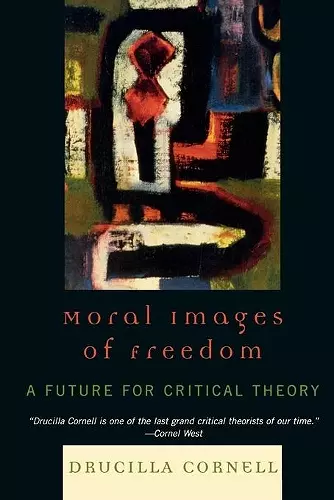Moral Images of Freedom
A Future for Critical Theory
Format:Paperback
Publisher:Rowman & Littlefield
Published:24th Aug '07
Currently unavailable, and unfortunately no date known when it will be back
This paperback is available in another edition too:
- Hardback£54.00(9780847697922)

Moral Images of Freedom resurrects the Kantian project of affirmative political philosophy and traces its oft-forgotten influences found in thinkers such as Martin Heidegger, Ernst Cassirer, Frantz Fanon, and Walter Benjamin. Drucilla Cornell responds to nihilistic claims about the empty purpose of critical theory in a world so utterly captured by violence in all of its worst forms: economic, social, political, and cultural. Cornell instead draws together a sweeping thread of hope in the varied symbolic forms of freedom persistent throughout the work of a broader range of critical theorists and addresses the burning challenge for such work to respond seriously to the need for a decolonization of critical theory itself and a sustained commitment to the possible future of socialism.
Climbing the highest mountains of philosophical reflection, Moral Images of Freedom is an illuminating and profound journey to a promised land of self-discovery and authentically grounded hope. Cornell remarkably manages to displace prevailing political pessimism with an inspiring vision of emancipatory politics and moral engagement. -- Richard Falk, Albert G. Milbank Professor of International Law Emeritus, Princeton University
Drucilla Cornell's Moral Images of Freedom places philosophy on the side of hope. Its distinctive contribution is to show how the tendencies in twentieth-century thought that threaten us with nihilism may also inform and inspire a deepening of our faith in ourselves. To read this book is to discover a path to greater freedom and connection in what had seemed to be a history of despair. -- Roberto Mangabeira Unger
The power of this book lies in the courage, erudition and openness to the future that it mobilizes in making its case for continuing the struggle on behalf of a moral ordering of our social world. Moving deftly through Kant, Heidegger, Cassirer, Fanon, Lewis Gordon and others, Prof. Cornell makes a powerful contribution to the revitalization of contemporary critical theory by resting this project on the principle that if we attend to the limits of our knowledge, we will discover that it is still possible to imagine the surpassing of our present order by a more just one. As such, it speaks courageously to our present moment of disjuncture. -- Paget Henry, Brown University
In the face of terrible suffering, Cornell advances what she calls an affirmative political philosophy. Offering a theoretical vision attuned to this relationship of reason and sensory existence, Cornell exemplifies just how this can be done by mining what is vital in Kant, Heidegger, Derrida, Fanon, Cassirer, and Benjamin. One of the book's great gifts is the way that it develops this insight, showing how engagement with Cassirer's understanding of the diversity and generative power of language can be put to the service of 'decolonizing' critical theory. Cornell calls for a new poetics of consciousness. Such a poetics takes us beyond the limitations of conceptual knowledge, opening us to unlikely, and uncanny, connections. The result is a stirring vision of what critical theory can be: hopeful, invigorating, humane. * The Review of Politics *
Drucilla Cornell is one of the last grand critical theorists in our time. This great tradition — from Kant to Benjamin and Adorno — is made relevant in her profound and courageous philosophical engagements with redemptive possibilities in our dystopian era. She sustains a contagious utopian defiance of the bleak present with a subtle wrestling with our limits — a wrestling that takes us through empire, class, race and gender toward a just and free world. -- Cornel West, Union Theological Seminary
ISBN: 9780847697939
Dimensions: 230mm x 153mm x 14mm
Weight: 295g
188 pages